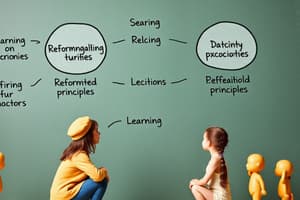Podcast
Questions and Answers
What psychological approach did Wilhelm Wundt establish?
What psychological approach did Wilhelm Wundt establish?
- Cognitive Psychology
- Structuralism (correct)
- Functionalism
- Behaviorism
Which method did Structuralists primarily use to explore the mind?
Which method did Structuralists primarily use to explore the mind?
- Behavioral observation
- Case studies
- Introspectionism (correct)
- Statistical analysis
What components did Structuralists break consciousness down into?
What components did Structuralists break consciousness down into?
- Sensations, images, and affections (correct)
- Concepts, perceptions, and memories
- Instincts, drives, and stimuli
- Behavior, cognition, and emotion
How would a Structuralist investigate the perception of a triangle?
How would a Structuralist investigate the perception of a triangle?
Which philosopher's work is recognized as significant in the context of learning and behavior?
Which philosopher's work is recognized as significant in the context of learning and behavior?
What is the primary focus of Structuralism in psychology?
What is the primary focus of Structuralism in psychology?
What underlying assumption is made by Structuralists about psychological processes?
What underlying assumption is made by Structuralists about psychological processes?
What aspect of learning was explored in the context of habits?
What aspect of learning was explored in the context of habits?
What is the absolute threshold in the context of sensation?
What is the absolute threshold in the context of sensation?
Which concept refers to the smallest increase or decrease in a physical stimulus needed to notice a change?
Which concept refers to the smallest increase or decrease in a physical stimulus needed to notice a change?
According to Weber's Law, the just noticeable difference (JND) is determined as:
According to Weber's Law, the just noticeable difference (JND) is determined as:
What is the primary focus of early psychophysics?
What is the primary focus of early psychophysics?
Which aspect of the theories in early psychophysics is highlighted as a strength?
Which aspect of the theories in early psychophysics is highlighted as a strength?
What is the primary method used in introspection?
What is the primary method used in introspection?
What is the goal of elemental analysis in the context of perception?
What is the goal of elemental analysis in the context of perception?
What role do cues play in the habit loop?
What role do cues play in the habit loop?
What might internal cues include?
What might internal cues include?
What happens during the reward phase of the habit loop?
What happens during the reward phase of the habit loop?
How did structuralism contribute to psychology despite facing criticism?
How did structuralism contribute to psychology despite facing criticism?
What is a common external cue in the habit loop?
What is a common external cue in the habit loop?
Which statement best defines functionalism?
Which statement best defines functionalism?
Flashcards are hidden until you start studying
Study Notes
Learning Theories
- Early researchers used experimental designs to understand human behavior through sensory, perceptual, and cognitive perspectives.
- Early researchers, such as Ivan Pavlov, focused on how our bodies learn about habits.
- Early researchers studied the nature of knowledge from philosophical and scientific viewpoints.
- Wilhelm Wundt (1832-1920) was a German psychologist who is often considered the founding father of experimental psychology.
Structuralism
- Structuralism is a school of psychology that focuses on the basic elements of consciousness.
- Structuralism seeks to understand the structure of the mind by breaking it down into its elementary parts.
- Structuralism uses introspection as a primary research method, where individuals are asked to carefully reflect on and report their conscious experiences.
Early Psychophysics
- Early psychophysics studied the relationship between physical stimuli and psychological sensations.
- Understanding the absolute threshold is a key part of psychophysics.
- The absolute threshold is the smallest amount of a stimulus that can be detected 50% of the time.
- The difference threshold, also known as the just noticeable difference (JND), refers to the smallest change in a stimulus that can be detected 50% of the time.
- Weber’s Law states that the JND is a constant proportion of the original stimulus.
The Habit Loop
- The habit loop is a three-part process that describes how habits are formed and maintained.
- The cue initiates the habit loop and can be internal or external.
- The routine is the behavioral response triggered by the cue.
- The reward is the positive outcome that reinforces the habit loop.
- The reward can be tangible or intangible, and it provides a sense of satisfaction or pleasure.
- The habit loop becomes ingrained over time, making the behavior automatic and almost unconscious.
- Understanding the habit loop can help us understand how habits are formed and how they can be changed.
Studying That Suits You
Use AI to generate personalized quizzes and flashcards to suit your learning preferences.




